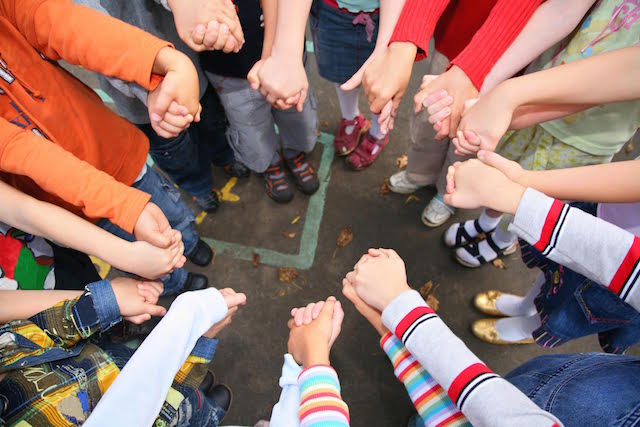
I once heard that if we speak to someone at the level of the mind, we can only reach them at the mind level; if we speak to someone at the level of the heart, we have the ability to access their hearts.
When we speak with stories, however, we create transformation.
Michelle’s mother realized Michelle was transgender while consoling her after a panic attack one night.
Michelle began having really bad panic attacks before bed when she was 10 years old. On this one particular night, while rocking her in her mothers arms, Michelle asked a question. Not having raised her in a particular religion, her mother was shocked by it.
Through her tears, Michelle asked, “Mom, you wouldn’t lie to me would you? If I asked you something, you wouldn’t lie?” “Of course not, honey,” her mom answered. “You can ask me anything.”
“Mom, if I die, God won’t make me do this again will he? If I die, I won’t have to come back and do this again?”
Michelle had heard about reincarnation and was asking her mom if she would have to come back again in a boy’s body if she died. If so, she couldn’t do it again.
The very next day, Michelle’s mother Googled, “I think my child is transgender.”
She continued to share their journey of transition with a class of seventh graders during an educational event I was part of last week.
While she was sharing Michelle’s story, I looked around the room and saw 20 12-year-old kids listening. They listened with intent, and they heard everything she said.
I was amazed at the questions they asked, the insight they displayed, and the experiences they shared from their own lives.
One girl shared how she’s liked wearing boys’ clothes ever since she can remember. So when her uncle, who always asks why she wears boys’ clothes, gave her a blouse for her birthday, it made her feel sad. She wondered how someone who knew her so well would purposefully get her something he knew she wouldn’t like.
That same little girl told us how just the other day, while shopping in the boys’ section for something to wear to a friend’s birthday, she was told by a sales lady that she was in the wrong section. The little girl wanted to know our advice on what she could’ve done. She said,
“I knew I was in the right section, but based on the sales lady’s reaction, I didn’t know how to respond. I just let her walk me to the section she thought I belonged.”
Michelle’s mother, who shared for the first time in public one of the most moving stories I’ve had the privilege of hearing, was able to answer the little girl’s question in a truly transformational way. She told the entire class she was there to share with them her daughter’s experience.
She began by telling the seventh grade class how when she gave birth and the doctor told her it was a boy, she chose a typical boy’s name. She didn’t know much about gender and sexuality, but knew something was going on with her child from early on.
Ever since Michelle could walk, she always wanted to play with girls’ toys. She would even wear dolls’ clothes and loved anything to do with princesses. When she was five or six, Michelle wanted to dress as a princess for Halloween two years in a row. In their house, toys didn’t have gender restrictions, so it wasn’t much of a concern.
It wasn’t until Michelle started kindergarten that her mom really began to pay attention. Like a lot of stay-at-home moms I know, she volunteered at her daughter’s school and noticed how different Michelle acted in class from when they were at home. The thing she noticed most was how Michelle began to lie. She would lie about the toys she liked and what games she wanted to play at school.
She appeared to observe the little boys and try to model her behavior by what they did—not what she naturally preferred.
My eyes filled with tears while I listened to Michelle’s mom describe a memory of Michelle’s kindergarten teacher asking her about her favorite color. She knew her favorite color was purple, so when she overheard Michelle say in front of her class it was the same color as the boys who answered, she couldn’t believe she had lied.
Most of us don’t realize how insightful children really are. They’re so aware of their surroundings that they’ll even begin to pretend to be someone they’re not, just to fit in.
One of the biggest reasons I hear from parents for not discussing gender and sexuality with their children is, “They’re too young to understand.” What I hear with that response is, “It’s not something I understand or am comfortable speaking with them about.”
Children will learn anything we teach them.
At the end of the discussion, a young boy asked, “Why do stereotypes exist and why do we have to have them?” I answered, “That’s a really great question, and you’re so smart to even ask. Stereotypes exist if we don’t question why we believe something we do. They also continue to exist if we don’t speak up to challenge them otherwise.”
I told him how grateful I was for his question and for the entire class. I let them know it’s through their questions and the information they learned that they’ll be able to help challenge stereotypes and be allies for the LGBT community.
What I saw last week was truly amazing and gave me so much hope for the future. I saw a group of young children asking really powerful questions and challenging norms. I saw a group of critical thinkers. I saw a group of human minds so open and available to learn.
I also saw how it really is true that children will learn anything we teach them. They can learn acceptance just as easily as intolerance. All it requires is the space to have the conversations and a willingness to be open.
~
Author: Chris Tompkins
Image: Courtesy of Author via Pavel Losevsky
Editor: Toby Israel
~











Read 0 comments and reply